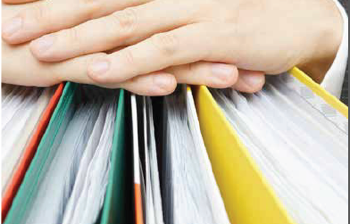Please download this article as a PDF
An introduction to the main business tax.
The basics of VAT for UK businesses
An introduction to the main business tax.
VAT is a business tax on the supply of goods and services. It is charged at varying rates depending on what is being supplied, who it is being supplied to and where it is being supplied to.
But with Brexit, temporary rate changes due to COVID-19, the rollout of Making Tax Digital for VAT and new rules relating to the reverse charge and subcontractors, this is a complex time for a business grappling to ensure VAT compliance. With penalties in place for non-compliance, it’s important to seek professional help to aid with navigating any tricky issues.
As a VAT-registered business, you will essentially act as a collecting agent for HMRC. Your business can recover the VAT it incurs on purchases (known as input VAT), but in return must charge VAT on sales (output VAT).
The difference between the input VAT incurred and the output VAT charged is either paid over to HMRC or refunded each time the business submits a VAT return.
The UK VAT rates currently in force are:
- standard – 20%
- reduced – 5%
- zero – 0%.
No VAT is charged on goods and services that are exempt from VAT, such as insurance, or outside the scope of the UK VAT system, such as salary payments.
Which of the above categories the goods or services fall into matters because it affects whether the business can register for VAT and how much VAT it can reclaim.
There are specific VAT rules for certain trades, such as builders and charities, that affect how to account for VAT, how much must be paid and how much can be reclaimed, which is not covered in this article.
Who should register for VAT?
Any ‘taxable person’ who makes ‘taxable supplies’ of goods or services, generally within the UK, will need to consider if they should be registered for VAT.
Since the criteria for VAT-registration is based on taxable supplies being made, it is important to be able to identify what the taxable supplies are. As with all things VAT, this is not quite as straightforward as it may sound.
There are broadly four tests to determine whether a supply is taxable and a transaction is within the scope of UK VAT if all four are satisfied.
Supply of goods or services
There is a distinction between the two types of supply, as different VAT treatments might apply. Broadly speaking, if no goods or services are provided, there is no supply. If no consideration is given, it will not usually be a taxable supply.
Place of supply
There are sometimes complex tests needed to determine the ‘place of supply’, particularly for services. As a general rule, if the place of supply is outside the UK then no UK VAT is due.
Taxable person
A taxable person is any entity – a sole trader, partnership, company or charity – which should be registered for UK VAT.
Business or economic activity
Was the taxable supply made in the course or furtherance of any business or economic activity carried on by that person?
It’s worth noting that as well as the obvious goods and services which are considered a supply, there are special rules to consider that determine the time and value of a supply for barter transactions, face-value vouchers and imported services.
These transactions also need to be taken into account when determining the level of taxable supplies made by the business.
The rules and exceptions can be complex, so it is worth seeking expert advice if your business does engage in such transactions.
When to register for VAT?
Having identified the value of your business’s taxable supplies, how do you determine whether your business should be registered for VAT?
Keeping accurate up-to-date accounting records will be key to ensuring the business complies and is able to identify the point at which it must be registered by.
You must notify HMRC of the liability to register for UK VAT if your taxable turnover has exceeded £85,000 in the last 12 months, or if you believe it will exceed £85,000 in the next 30 days alone (ignoring past turnover).
Failure to register on time will result in HMRC levying a penalty unless there is a reasonable excuse for the delay. The penalty is a percentage of the VAT unpaid as follows:
- 5% if you registered no more than nine months late
- 10% if you registered between nine and 18 months late
- 15% if you registered more than 18 months late.
If your business makes taxable supplies it may also choose to voluntarily register for VAT, even if total taxable supplies are below the VAT threshold.
Once registered, you can voluntarily deregister for VAT if you believe your taxable supplies for the next 12 months will fall below £83,000. There are some situations where it is compulsory for a business to deregister.
VAT schemes to register under
Once registered for VAT, your business will be expected to account for output VAT at the appropriate rate on all its taxable supplies and it may reclaim input VAT.
It will need to identify which rate of VAT will apply to each supply made and, in the case of input VAT, it will need to identify which purchases it is able to reclaim VAT on.
You can usually reclaim the VAT on goods and services purchased for use in the business where there is a valid VAT invoice for that purchase. VAT cannot be reclaimed on:
- anything that’s for private use
- goods and services the business uses for VAT-exempt supplies
- business entertainment costs
- goods and services sold to the business under one of the VAT second-hand margin schemes
- business assets transferred to the business as a going concern.
The business will also need to decide which scheme it wishes to be registered under, although not all schemes will be available.
The most commonly used VAT schemes are standard VAT accounting, the flat-rate scheme, and the cash accounting scheme. Each one has their own pros and cons and we can help you decide which will best suit your business.
VAT & COVID-19
With the challenges that COVID-19 has brought to the business community, the Government has brought in some temporary measures to help ease the road to recovery.
This began with the initial announcement that businesses could defer payment of VAT liabilities due between 20 March 2020 and 30 June 2020.
For those that could not afford to pay the deferred liability in one payment by 31 March 2021, the payment of this VAT can be spread over a maximum of 11 monthly payments.
However, to take advantage of this, your business must sign up through their online account by 21 June 2021. The later you sign up, the fewer payments the liability can be spread over, as the last instalment must be paid by 31 March 2022.
In recognition of the additional stresses that COVID-19 restrictions have placed on the hospitality sector, a reduced VAT rate applies to certain supplies relating to hospitality, hotel, holiday accommodation and admission to certain attractions to 5% from 15 July 2020 to 30 September 2021.
In Spring Budget 2021, rather than returning to the standard rate of 20% from 1 October 2021, it was announced there would be a new temporary reduced rate of 12.5%.
This will cover supplies with a tax point between 1 October 2021 and 31 March 2022, with the purpose of easing these businesses back to the application of the standard rate of VAT on their supplies.
We can handle any aspect of VAT.




